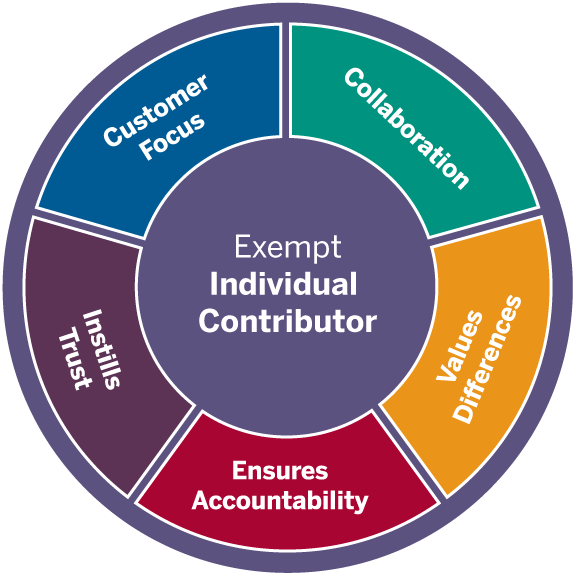Exempt Individual Contributor: Expert
Strategic Mindset
Seeing ahead to future possibilities and translating them into breakthrough strategies
Being strategic involves looking, planning, and moving into the future with clear intentions and purposeful actions. Some think being strategic is an either-or proposition: that a person is either tactical or strategic; interested in details or the big picture. A strategic mindset requires readiness for both. It’s about doing things today with an eye toward tomorrow. Making decisions now that will lead the organization toward its future objectives.
You show this competency when you:
- Anticipate future trends and implications accurately
- Readily pose future scenarios
- Articulate credible pictures and visions of possibilities that will create sustainable value
- Create competitive and breakthrough strategies that show a clear connection between vision and action
How to develop this competency:
Make customer intimacy a priority
A winning strategy is designed around the customer. Understand your customers historically, today, and most importantly tomorrow. What products and services do they want more or less of? How can you improve the user experience? Gather fresh insights. Determine which customers you want to keep and which you want to attract in the future. Allocate your greatest resources to your primary customers.
Recognize the value of strategy
Some reject strategy. They say they’d rather be doing something useful, like solving today’s problems. While it is true that most strategic plans don’t materialize as planned, that doesn’t mean it is wasted effort. A good strategy leads to practical decisions about what to do, who to hire, how to allocate funds, and deploy resources. If you have doubts about whether to move ahead with a project, determine if it is in line with our strategy. If you are wondering which option to choose, determine which option best aligns with our strategy. Strategy makes good choices clear and leads to less wasted effort.
Make room for strategic priorities
Burning issues require attention. It wouldn’t be wise to ignore important demands of the day. Neither would it be wise to avoid what will matter most in the long run. You need to strike the right balance. Talk with colleagues to be sure you agree on what projects are mission critical, important, or nice to have. If you can’t justify why something is important, question why it’s on your plate. You may learn something or find a new solution. Reserve “thinking time” on your calendar to weed out distractions and make strategic adjustments.
Learn more:
- Video: The Difference Between Strategic Planning and Strategic Thinking
- Article: HBR: How to Demonstrate Your Strategic Thinking Skills
- Article: Developing a Strategic Mindset
- Book: How to Think Strategically: Sharpen your Mind, Develop your Competency and Contribute to Success by Greg Githens
- LinkedIn Learning: Strategic Mindset course collection

Exempt Individual Contributor
Page updated: February 2021
IU Human Resources
Contact Us
